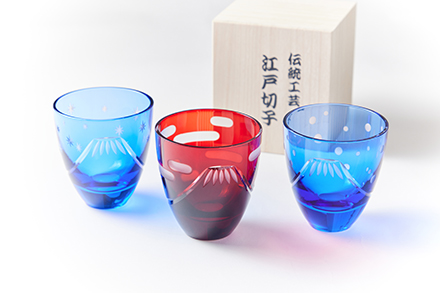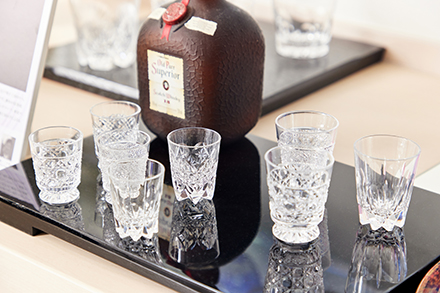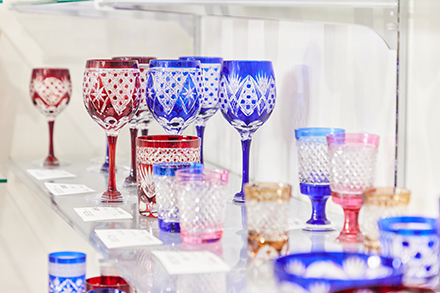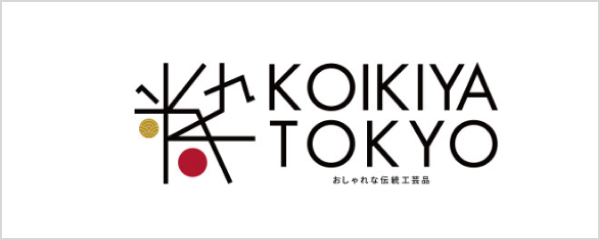Edo-Kiriko glassware of Shimizu Glass is known for its high level of techniques
The birth of Edo-Kiriko is said to be around 1834. Legend has it that its beginnings lie in glassware etched by Mr.Kyubei Kagaya, a glass merchant in Odenmacho, Edo (NKA Tokyo) Afterwards, he imported techniques introduced from abroad while exploring his own original developments, and the crafting methods that have been passed down to us as the Edo-Kiriko tradition were finalized.
Shimizu Glass opened in 1923. Established as a special glass processing business, its high level of techniques garnered high praise, and it started receiving the orders of glass tableware manufacturing from large scale tableware manufacturers. Later, starting in 1994, it began producing Edo-Kiriko glassware as its own original products. Widescale attention was garnered from the beauty and detail of these Edo-Kiriko works that were born from an advanced technique ability honed from the company's experience in high quality glass tableware manufacturing.
The studio environment is the perfect place to experience the intensity of its artisans
This activity starts with learning about the Edo-Kiriko crafting that Shimizu Glass produces. After learning basic knowledge through a video, you will move on to a quick studio tour where the artisans work everyday. Watching two experienced and professional male artisans and five young and energetic female artisans extremly concentrated on their works at Edo-Kiriko crafting might be your impressive experience.
Etch your own original pattern to decorate Mt. Fuji pattern
After your studio tour finishes, the Edo-Kiriko crafting activity starts at a work table. Select your choice of a red or blue glass pre-adorned with a Mt. Fuji design on it. You can add whatever you like around the figure of Mt. Fuji already rendered by the hand of an artisan.
This activity of rendering a pattern on glass uses the same kind of diamond wheel used by Edo-Kiriko artisans. Press the glass up to the wheel that rotates at a high speed and etch in each part of the pattern you have imagined.
A memory of the concentrated time you spent etching on glass
The secret to the detailed craftwork of etching a basic pattern shape is to press the glass flat against the wheel. Even when you feel that you are pressing it flat against the diamond wheel, if the angle of the glass alters, the etched line might slip. Imagine the technique of artisans who never accept even a millimeter of slipping, and beautifully etch each single pattern.
After about 30 minutes, what waits for you on the other side of concentrating on the glass in front of you is your own original glasswork. Put your one-in-the-world original Edo-Kiriko glass in a paulownia wooden box and take it back home as a memory of the time you spent concentrating on intense work.
Brightly, beautifully, and gorgeously enhance your daily table set
Edo-Kiriko glasses with their beautiful glittering patterns are also appraised as art objects passed down to today from the Edo period. However, Ms.Michiyo Shimizu, the third generational representative of Shimizu Glass, comments, "Edo-Kiriko glassware is meant to be a familiar object. In addition to displaying and admiring them, we would like everybody to enjoy using them in all sorts of different parts of their daily lives."
Enjoy your moments at your household table, remembering the time you spent working with Edo-Kiriko glass that brightly, beautifully, and gorgeously decorates your daily life.
Established in 1923 in Honjo Kikukawacho (present day Kikukawa, Sumida Ward). Subcontracted for a major tableware manufacturer in 1947. After moving to Horikiri, Katsushika Ward in the subsequent year, it began manufacturing and selling Edo-Kiriko products in 1994. The praise is high for their processing techniques accumulated through cut-glass manufacturing experience, and they are displaying an array of activity that transcends the boundaries of Edo-Kiriko, with examples such as being involved in the wall decoration inside of the elevator of Tokyo Sky Tree®.


















